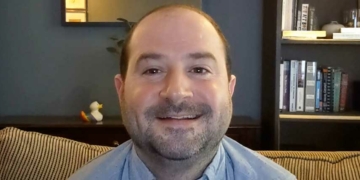In October 2020 there was a development that has proved to be a game-changer in the battle to defend sex-based rights and protections. An organisation called “Sex Matters” was founded by Rebecca Bull, Naomi Cunningham, Maya Forstater, and Emma Hilton. Since then, this professional and energetic body has continued to do sterling work and to go from strength to strength.
To me – and I am not alone in having this impression – Sex Matters has more than a hint of The Cavalry about it as we struggle against these new, unexpected, and alarming attacks on human rights that have assailed us with particular ferocity in recent years.
What is particularly encouraging about Sex Matters is its straightforward and no-nonsense approach, embracing a Big Tent paradigm that rejects spiteful factionalism and purity politics. Maya Forstater, Executive Director of Sex Matters, told me: “We think it’s really important to bring more people into the debate on sex and gender – on the left and right and politically homeless, gay and straight, secular and religious. Sex Matters to everyone.”
Sex Matters campaigns effectively and dynamically on several fronts, but their central focus this week is on encouraging responses to the Government’s Conversion Therapy consultation, which ends this week, on 4 February, at 11.45 pm. Maya is in no doubt as to what underlies the campaign to ban “conversion therapy”: “The shocking thing about the plan to ban CT is that it is an issue that none of the big organisations backing it said much on until they lost the debate on self-ID in the UK. It’s a repackaging of self-ID and Stonewall’s move to undermine the single-sex exemptions in the Equality Act.”
If you have not yet submitted your response to the consultation, there is no need to panic. Sex Matters have made the process as easy as possible, via the Respond to the Conversion Therapy consultation page on its website.

Sex Matters have put a great deal of work into making it as simple as possible to respond to the consultation. It is to their great credit that they are campaigning hard to prevent young people who are lesbian and gay, high-functioning autistic, gender non-conforming, or from backgrounds where there is trauma, from being sucked down the medical, surgical, social, and psychotherapeutic gendernightmare rabbit hole called “Modern Conversion Therapy“.
A new Conversion Therapy Act that accords to transgender identification the same status as same-sex orientation, would provide social engineers and online groomers with the full protection of draconian new laws that will further disempower parents and all those who believe that defending fundamental child safeguarding is non-negotiable.
There are now several specialised gender-critical organisations in the UK, most of which make a very impressive contribution to the campaign. What seems to be unique about Sex Matters, however, is its status as a highly competent, well organised, and fiercely astute umbrella group. They are at the forefront of the campaign to prevent the introduction of harmful conversion therapy legislation that would have the potential to cause particular harm to lesbian and gay children.
The Bayswater Support Group, which supports families with a young person who identifies as transgender, recently reported that, in the 400 families they support, over 50% of the young people who identified as transgender had come out as lesbian or gay before being exposed to gender ideology.
As Maya rightly asserts, “Sex Matters” to everyone – including to lesbian and gay people, given that our sexual attraction to others is based on sex, not on subjective and nebulous “gender”. When we lose the right and freedom to declare we are attracted to people of the same sex, we lose the right and freedom to be gay or lesbian.

It is therefore completely understandable that Sex Matters have become so involved in the Conversion Therapy Bill campaign, and it is why it is appropriate for them to be acknowledged and endorsed in an article of a lesbian and gay publication. Sex Matters is a very worthy organisation for lesbian and gay people to support – they are campaigning for our rights – and while we also need our own separate groups as lesbians, gay people, and bisexuals, it is, of course, very important that we work in solidarity with the wider gender-critical community.
Lesbian and gay people campaigning to defend our own and others’ sex-based rights and protections should, of course, reflect and research carefully before we commit our time, energy, and money to support any organisation. However, there is much about the work, the values, the culture, and the people associated with Sex Matters that speak for themselves.
To get a sense of the very impressive calibre of the people working for Sex Matters, one only needs to take a look not only at their six directors, but also at the twenty-four members of their new Advisory Group, set up on 25 January.
It is just possible that Sex Matters is emerging as the mothership that will provide overarching navigation of the gender politics battle front; and as lesbian and gay people, we are immensely invested in the outcome of that battle.

The Conversion Therapy consultation ends on Friday. Sex Matters, a great ally to lesbian and gay people, have made it easy to respond. They, and other organisations, are also encouraging people to visit their MPs in person, if possible, in order to highlight concerns around the Conversion Therapy Bill; and Sex Matters are already reporting some encouraging feedback as a result of such meetings. Maya stressed how important it is for people to see their MPs face-to-face, including after 4 February when the Government’s Conversion Therapy Bill consultation ends.
With the permission of the individuals concerned for their accounts to be disclosed under cover of anonymity, Sex Matters have shared with LGN the following experiences of people who had reached out to their MPs with respect to the Conversion Therapy Bill: accounts that demonstrate what Sex Matters is achieving with its campaign to encourage concerned people to attend their MPs’ surgeries. Other campaign groups are also encouraging their supporters to speak to their MPs in person.
“Today, when I challenged my MP about this, she appeared to think it was just about Gay Conversion therapy, not realising that it would criminalise normal therapeutic counselling for youngsters confused by their gender identity. She seemed incredulous and also not to believe me, but promised to look into this further. I told her it was a Trojan Horse Bill, hiding its criminalisation of therapists, doctors or teachers who question children presenting as having been born in the wrong body, behind the facade of gay conversion therapy. I really hope this makes a difference to my MP’s stance on the Conversion Therapy Bill.”
“They seemed largely asleep to the issue to begin with, then I shared my experience as a mum of a son who had thought he was ‘in the wrong body’, how it was resolved by a month offline, what was being taught in local schools (that their children will attend). Seemed horrified. Advised them of the professionals being gagged and sanctioned, again horrified.”
“I had a phone call from my MP this morning and it was really constructive – lasted about 20 minutes, with me stressing the child protection element and that I didn’t think parents and people working with children should risk being criminalised for giving young people the space to take time to reflect on a big decision, and ended with them saying they appreciated my concerns and that they would take the time to look into it in more depth and would also ask ministerial colleagues more about it.”
With respect to the completion of the consultation response with the help of the dedicated web page on the Sex Matters website, two options are offered to those who wish to send in a submission. Option 1 is the “full response” route, where respondents will answer all 15 online questions – which, we are advised, takes about an hour.
Those selecting Option 1 are invited to download the information sheet that Sex Matters have produced in order to guide respondents through completion of the Government’s online consultation form. It is suggested that respondents prepare their answers with the help of this information sheet and then paste them into the Government online consultation response form, which is also available on the Sex Matters page via a hyperlink.
For those who are short of time, or who do not have particular answers to all the questions, there is Option 2, which respondents are advised will take about 10 minutes to complete. Here, one simply needs to answer the two main questions in two text boxes. As the consultation requires responses to the full set of online questions, Sex Matters have provided their own answers to the remaining questions. Respondents intending to take Option 2 are invited to read through those answers to check that they agree with them. If they wish any of their answers to be different from the Sex Matters responses, they will need to take Option 1 instead.
Option 2 is completed on the same Sex Matters webpage that advises on the procedure for responding to the consultation, and it is submitted via a button on that page, which indicates consent to Sex Matters handling the response and sending it to the relevant Cabinet Office e-mail address.

Would you be surprised to learn that there seems to be a tripwire in the very first question on the Government’s consultation response document, that could lead to your whole submission being disregarded if you happen to believe that the proposed bill is completely unnecessary?
The first question is not one of the numbered questions – and Sex Matters explain why this initial question may act on the form as a filter. That question is, “Do you agree or disagree that the Government should intervene to end conversion therapy in principle?” and is followed by a selection of possible multiple-choice answers, ranging from “Strongly agree” to “Strongly disagree”, with “Prefer not to say” as the final option.
As the Government has been clear that this is not a consultation about whether to ban conversion therapy, but instead one about how to ban it, it is possible, Sex Matters explain, that anyone who answers “Disagree” to this question may have all their numbered answers discounted. It has therefore been recommended that respondents answer “Somewhat agree” to this question. There is then a box to answer the question, “Why do you think this?“, and this is where respondents will be able to explain, in their own words, why they think what they do on this topic.
If you would like to support the work of Sex Matters, whether with a one-off donation or a regular contribution, more information on how to do so is available here. You can also add your name to the Sex Matters mailing list here.
Gary Powell is a gay man and has been active in gay politics since 1980. He is the Research Fellow for Sexual Orientation and Gender Identity at the Bow Group and the European Special Consultant to the Center for Bioethics and Culture.
























Comments
No comments yet, be the first to leave a comment.